Key takeaways:
- Brand identity encompasses the core values and personality of a business, influencing how audiences perceive and connect with it.
- Defining a Unique Value Proposition (UVP) helps to distinguish a brand in a crowded market, focusing on emotional connection and client experience.
- Consistency across all platforms and messaging is crucial for brand recognition and building trust with clients.
- Engaging with your audience and being open to feedback enhances brand authenticity and can lead to stronger client relationships.
Author: Evelyn Harper
Bio: Evelyn Harper is an award-winning author known for her captivating novels that explore the complexities of human relationships and the beauty of everyday life. With a background in psychology and a passion for storytelling, she weaves intricate narratives that resonate with readers around the globe. Evelyn’s work has been featured in numerous literary magazines, and her debut novel was listed as a bestseller. When she’s not writing, she enjoys hiking in the mountains of her home state, Oregon, where she draws inspiration from nature and the world around her.
Understanding Brand Identity
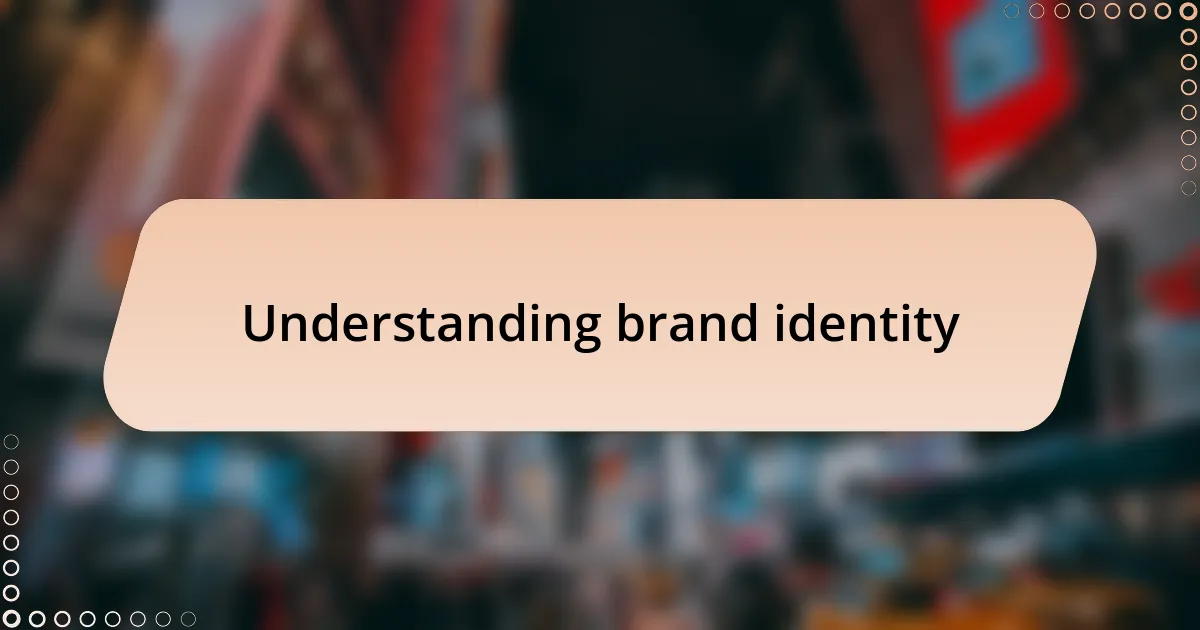
Brand identity is more than just a logo or a catchy tagline; it’s the essence of what your business stands for. I remember when I first started my journey in marketing consulting; I was overwhelmed by the competition. I realized that to connect meaningfully with my audience, I needed to articulate my values and vision clearly. How are you defining the unique qualities of your brand?
Every brand has a personality, just like people do. Take a moment to consider this: if your brand were a person, how would they dress, speak, and act? When I crafted my brand identity, I chose to embody a friendly, approachable persona. This decision helped me connect with clients on a deeper level, fostering trust and loyalty.
Building a strong brand identity also requires consistency across all platforms. I learned this from experience when my messaging varied too much from one campaign to another; potential clients became confused about what I truly represented. Consistency, I found, reinforces brand recognition and builds a sense of reliability. How consistent is your brand across different touchpoints?
Importance of Brand Identity
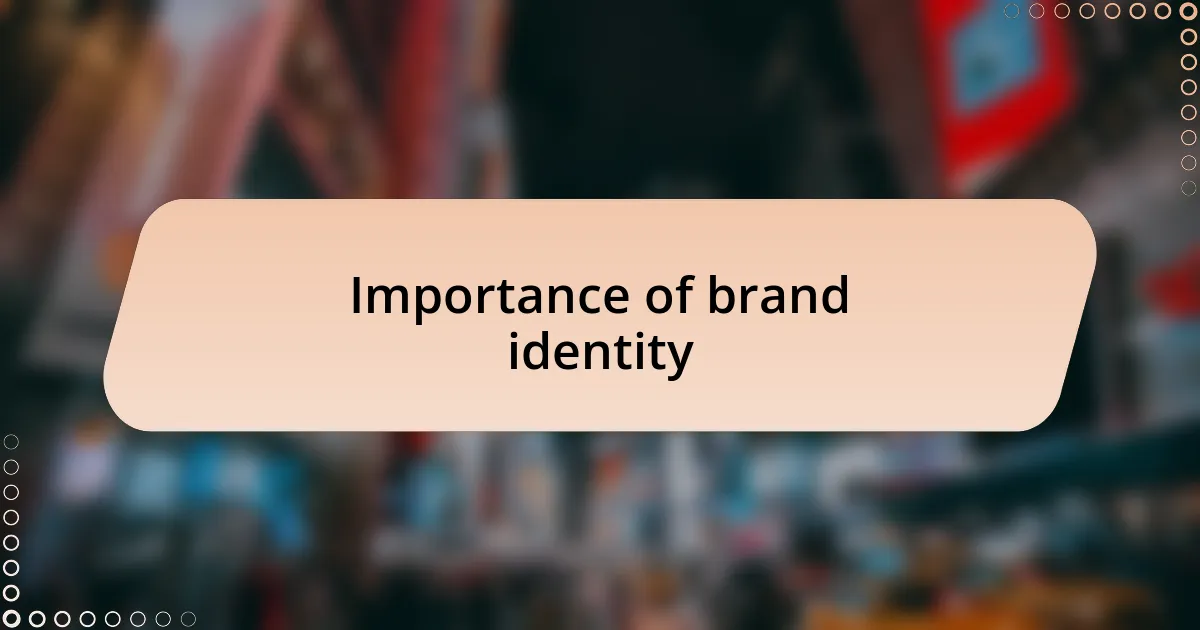
Brand identity is crucial because it sets the foundation for how your audience perceives your business. I vividly recall a time early on when I attended a networking event, feeling anxious about how to present myself. I realized that each interaction was heavily influenced by how I had established my brand identity; it played a significant role in forming immediate impressions and fostering connections.
When I streamlined my brand identity, it was like finding clarity in a fogged-up mirror. I remember a particular moment when a client told me they chose to work with me not just for my expertise, but because they resonated with my brand’s story. It reminded me that an authentic brand identity can evoke emotions and create lasting relationships, ultimately influencing purchasing decisions. What kind of story is your brand telling?
Furthermore, a well-defined brand identity not only attracts the right clients but also builds internal morale. I can think of a project where my team felt more motivated after we aligned our personal values with our brand’s mission. This alignment fostered a genuine sense of pride and ownership among us. Ask yourself: How does your brand identity inspire your team to contribute their best efforts?
Steps to Define Your Brand
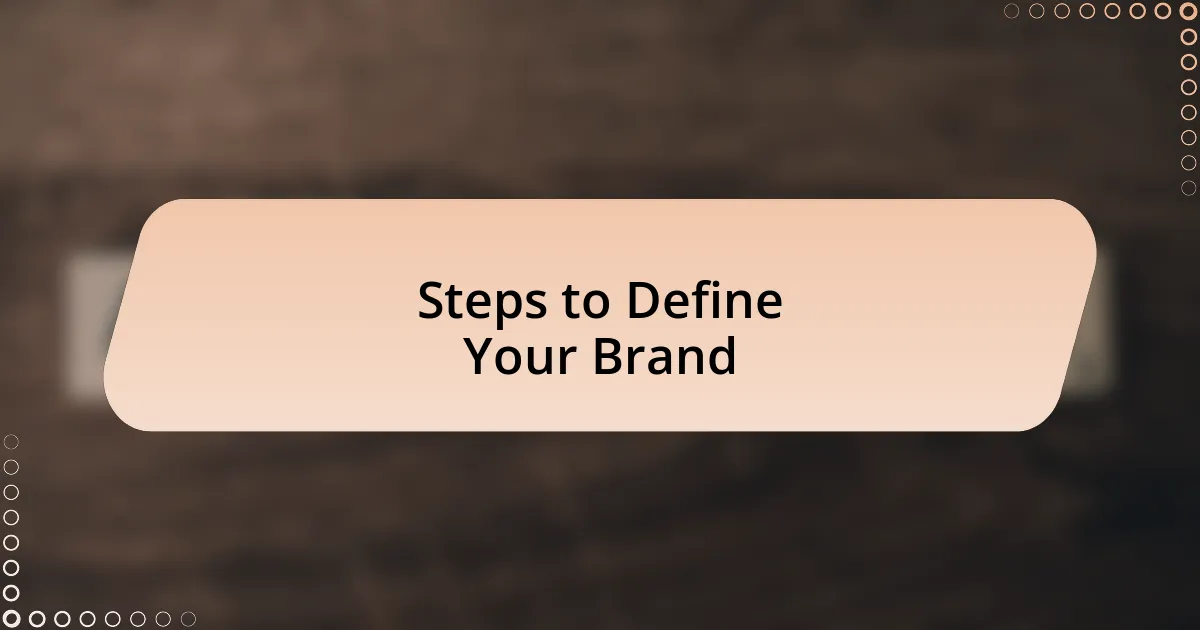
Defining your brand starts with understanding your core values. I remember sitting down one evening, really diving deep into what mattered most to me and my business. This wasn’t just a superficial exercise; it revealed the ethos I wanted to carry into every client interaction and marketing piece. What do your values say about your brand’s mission, and how can you express that in your messaging?
Next, consider your target audience. Developing a clear picture of who you’re trying to connect with was a game changer for me. I once created a campaign tailored specifically for a niche market, and the results were incredible because I spoke directly to their needs and aspirations. Have you taken the time to understand who your ideal client is and what they truly want from your brand?
Finally, don’t underestimate the power of visual identity. When I rebranded my logo and website layout, it felt like unveiling a new chapter. People started recognizing me more easily, and my brand seemed more cohesive. It reinforced the connection with my audience; they could see at a glance who I was and what I stood for. How does your visual identity reflect your brand’s personality and resonate with your audience?
Identifying Your Target Audience

Identifying your target audience doesn’t just shape your marketing strategies; it creates a bridge to genuine connections. I recall a time when I felt overwhelmed by the idea of reaching everyone. It wasn’t until I created detailed buyer personas that I understood who I was truly speaking to. What if you could visualize your ideal client—their struggles, motivations, and dreams?
Delving into demographics and psychographics helped me refine my messaging and offerings. For example, I once analyzed social media engagement data and discovered a large segment of my followers were young entrepreneurs seeking guidance on brand development. Tailoring my posts to address their specific challenges transformed my engagement rates. Have you explored what resonates with your potential clients?
Understanding your audience also touches on the emotional aspects of your brand. I vividly remember a heartfelt email from a client who felt seen and understood after consuming my content specifically designed for them. It reaffirmed that when you identify and connect with your target audience on a deeper level, you don’t just gain clients; you cultivate relationships built on trust and authenticity. How are you planning to connect with your audience’s emotions?
Crafting Your Unique Value Proposition

Crafting a Unique Value Proposition (UVP) is crucial for distinguishing yourself in a crowded market. I remember the moment I articulated my UVP—it felt like I had finally found my brand’s voice. My proposition centered around my passion for helping businesses turn their visions into reality, using a tailored, hands-on approach. Can you pinpoint what sets you apart from the competition?
The clarity that came with defining my UVP reshaped my marketing efforts, making them feel more purposeful. I often remind myself of a time when I turned a seemingly generic service into a distinct offering. By emphasizing personalized consultation rather than cookie-cutter solutions, I attracted clients who were looking for specific guidance. What unique skills or insights do you possess that can resonate with your audience?
Your UVP should reflect not just what you do, but how you make your clients feel. When I shared a client success story that embodied my UVP, the response was overwhelming. People connected with the emotions involved in that journey, which proved that potential clients are drawn to narratives that showcase real impact. Have you considered what emotional story your brand tells?
Personal Reflection on Brand Identity
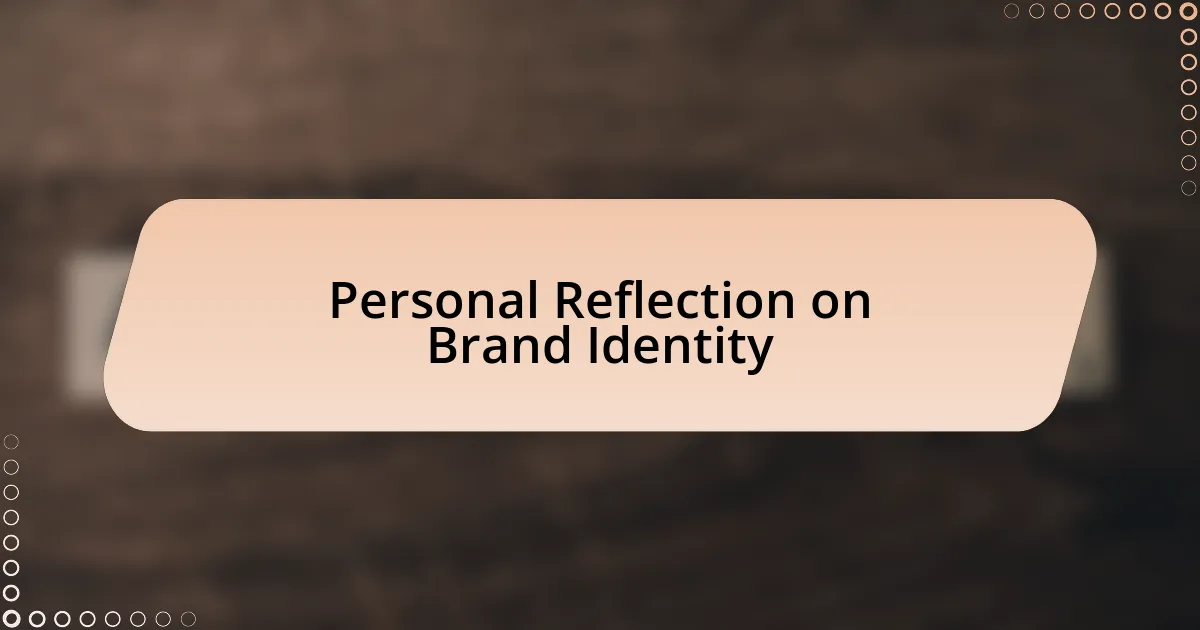
When I think about my brand identity, I can’t help but recall a pivotal moment early in my journey. I was chatting with a potential client who expressed frustration over the lack of genuine personal touch in the services they had encountered before. That conversation sparked a realization—I wanted my brand to be synonymous with authenticity and trust. It was in that moment that I decided my identity would revolve around creating lasting connections rather than just transactions. Have you ever had a chat that made you rethink your approach?
As I’ve evolved, I’ve come to understand that brand identity goes beyond just visuals or messaging. It’s about embodying values that resonate with my audience on a personal level. I remember developing a signature workshop that incorporated interactive elements. This not only showcased my expertise but allowed participants to feel a part of the experience. How do you ensure your offerings invite engagement and foster connection?
Reflecting on my brand identity also reveals the importance of consistency. There were times I strayed from my core message, and the response was palpable—clients were confused about what I stood for. Returning to my fundamental beliefs strengthened both my brand and my confidence. What guiding principles do you have in place that keep your brand aligned and recognized in the market?
Lessons Learned from My Experience
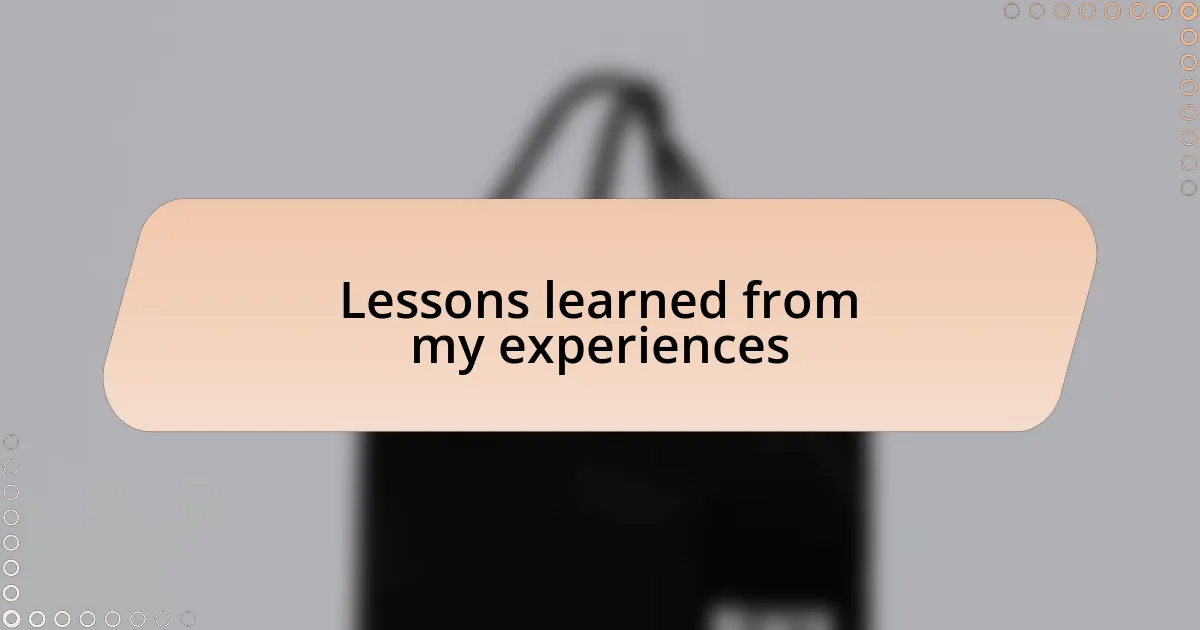
One of the biggest lessons I learned was the significance of listening to my audience. There was a time I launched a service based on what I thought was needed, only to realize it didn’t resonate with my clients. Their feedback was invaluable and taught me that understanding their needs should always be my starting point. How often do we rush into decisions without truly engaging with those we serve?
Another important takeaway was embracing vulnerability. I remember sharing a challenge I faced in my business during a webinar. Surprisingly, instead of detracting from my credibility, it humanized my brand and fostered deeper connections with my audience. That experience reinforced my belief that authenticity can turn potential weaknesses into strengths. Have you ever considered how sharing your struggles might actually strengthen your brand?
Lastly, I’ve learned the power of adaptability. There were moments when I rigidly held onto my original ideas, even when the market clearly shifted. Recognizing the need to pivot not only salvaged my brand but also allowed me to thrive. It showed me that flexibility is crucial in maintaining relevance. How easily do you adapt your approach when faced with change in your industry?